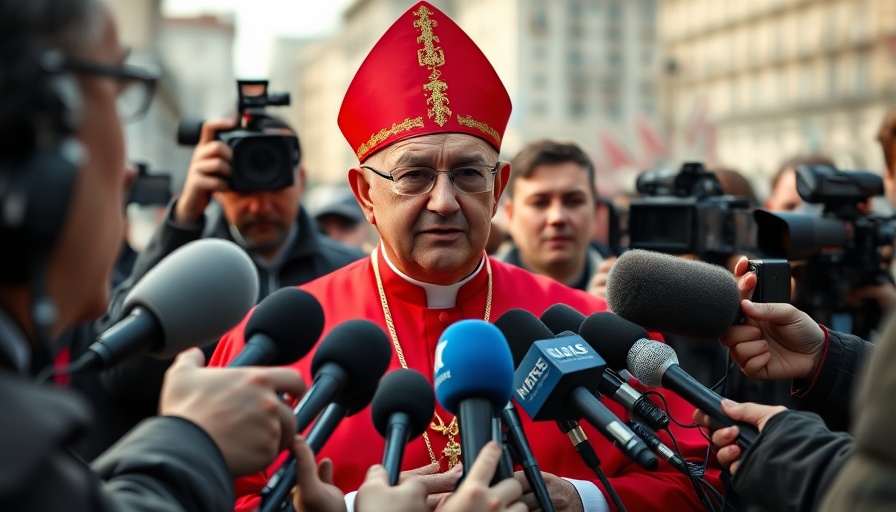
As the World Watches, the Vatican Prepares for the Conclave
Silence enveloped the Sistine Chapel, now poised for the upcoming papal conclave, where cardinal voters will gather under Michelangelo's iconic ceiling. This historic and sacred venue will host the critical decision-making process to elect a successor for Pope Francis, whose papacy has sparked dynamic conversations around modernizing the Catholic Church.
In 'Papal conclave set to begin: What you need to know', the discussion dives into the preparations and implications of this significant event, exploring key insights that sparked deeper analysis on our end.
Understanding the Conclave's Significance
The conclave, occurring on Wednesday, represents a pivotal moment for the Catholic Church. For many observers, the outcome of the conclave raises significant questions: Will the cardinals opt for continuity in Francis's more liberal legacy, or will they pivot toward a more conservative direction? This decision will reverberate across the globe, influencing millions of faithful followers and the Church's approach to contemporary issues.
Key Players in the Selection Process
A total of 133 cardinals will participate in the vote, each bringing unique perspectives shaped by cultural, geographical, and doctrinal influences. Leading the charge is Italian Cardinal Pietro Parolin, the Vatican's Secretary of State, recognized for his close alignment with Pope Francis's ideas. Another prominent figure is Cardinal Luis Tagle of the Philippines, often referred to as the "Asian Francis" for his progressive views. These frontrunners are indicative of the ideological spectrum within the conclave, signaling a potential continuation or shift from Francis's practices.
What to Expect from the Voting Process
As cardinals gather, they will convene first in prayer, reflecting on their duties and the future of the Church. Votes will be cast in a cloistered environment, with seals placed on the doors of the Apostolic Palace—a symbol of their detachment from the outside world. In the past, the electing process has been swift; Pope Francis himself was appointed after just two days of deliberation. Given the urgency many cardinals express today, there’s a palpable tension around the idea of how long this conclave will actually last.
The Legacy of Pope Francis and Its Impact
Under Pope Francis's leadership, the Catholic Church has seen a more compassionate approach to various social issues, inviting heated discussions among traditionalists and reformists. His legacy is foundational for the ongoing dialogues shaping the Church's future, particularly regarding inclusivity and social justice. Cardinal Timothy Dolan of New York hinted at the mixed sentiments prevailing among the cardinals, showcasing the need for deep conversations within the Church during their final general meetings.
Local Perspectives on the Papal Conclave
For residents of Pennsylvania, the papal conclave may seem a distant occurrence; yet, its implications stretch to their communities as public policy and social values are often influenced by ecclesiastical decisions. Concerned Pennsylvanians may contemplate how the new pope's stance on critical global issues—such as climate change, immigration, and social inequality—could affect local outreach initiatives and interfaith dialogues vital to fostering community harmony.
Emotional Connections to the Papal Election
The conclave evokes a myriad of emotions, from hope to anxiety, especially among devoted Catholics. Many await news with bated breath, reflecting on their hopes for a leader who will not only uphold Church traditions but also engage with the pressing social dilemmas facing their congregations today. The overarching narrative of faith, leadership, and communal responsibility resonates strongly in Pennsylvania, creating a unique cultural connection to the Vatican's decisions.
Why It Matters: The Broader Implications of the Conclave
The conclave's decisions extend beyond the walls of the Vatican; they penetrate social, cultural, and political landscapes worldwide. For example, the new pope's approach towards sustainability and global poverty could shape humanitarian efforts, echoing far beyond Europe. As Pennsylvania residents keep an eye on this global event, it's essential to recognize how it might inspire local advocacy and policy-making.
What You Can Do
As the conclave unfolds, it offers an opportunity for communities to engage in meaningful conversations about faith, tradition, and modernity. Residents are encouraged to join local discussion groups or attend services that reflect on these themes. In doing so, community members can contribute to the narrative shaping the future direction of the Church and its relationship with societal values.
 Add Row
Add Row  Add
Add 




 Add Row
Add Row  Add
Add 

Write A Comment